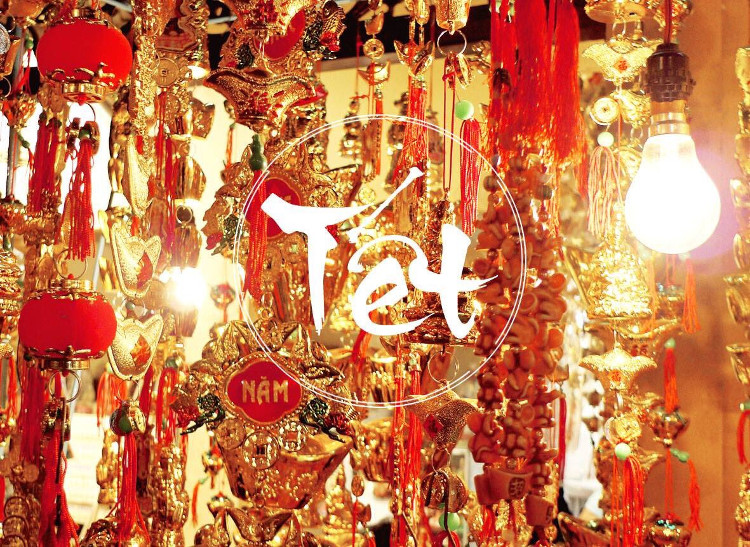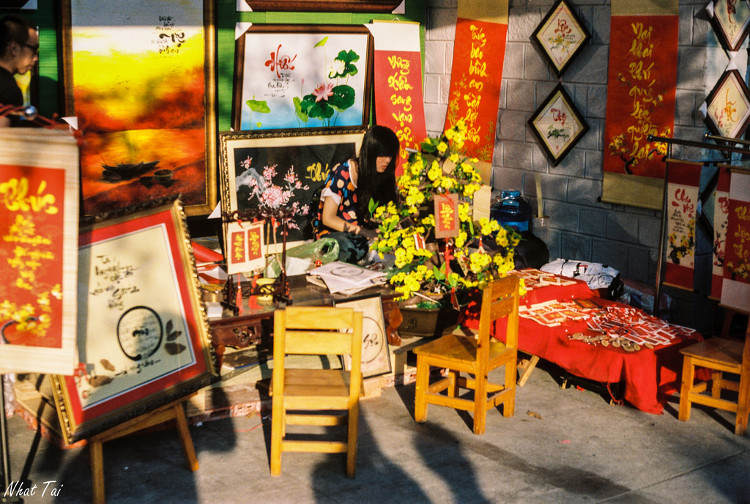The origin and human meaning of the Lunar New Year
Tet comes spring is not only the longing of many children to be able to wear new clothes, eat jam cake and especially get lucky money but it also has a profound meaning. That is the intersection point between the old year and the new year, between a cycle of operation of heaven and earth, all kinds of trees. Besides, there is a desire for longevity of life, harmony of Thien - Dia - Nhan, cohesion in community, clan and family. Lunar New Year is also an occasion to turn to the origin. That is the spiritual value, also the deep emotional value of the Vietnamese people, becoming a good tradition.
Lunar New Year - also known as Tet, Tet, Lunar New Year, Traditional Tet, New Year or simply: Tet . "Tet" is "weather" . The two words "Nguyen Dan" are of Chinese characters; "raw" means the beginning or the beginning and " early " is the early morning. So reading the correct phonetic must be "Full Text" . The Lunar New Year is called by the Vietnamese with a very loving name "Tet Ta" , to distinguish it from "Western New Year" (Lunar New Year).

Lunar New Year - also known as Tet, Tet, Lunar New Year, Traditional Tet .
Chinese New Year is calculated from what date?
Since the calculation of the Vietnamese lunar calendar is different from China, the Lunar New Year of the Vietnamese people does not completely coincide with the Chinese New Year and other Chinese-influenced countries.
Because lunar calendar is the calendar according to the operation cycle of the moon, the Lunar New Year is later than the Lunar New Year. Due to the law of 3 leap years of a lunar month, the first day of the Lunar New Year is never before January 21, and after February 19, the calendar usually falls between late January and mid-February. Calendar. The entire Lunar New Year holidays usually last for about 7 to 8 days at the end of the old year and the first 7 days of the new year (December 23 until the end of January 7).

The Lunar New Year holiday usually falls around the end of January to the middle of February.(Photo: Nhat Tai).
The origin of the Chinese New Year
Strongly influenced by Chinese literature for more than 1000 years, the Northern Lunar New Year is also one of the cultural traits imported during that time. According to Chinese history, the origin of the Chinese New Year is from the Three Kings Emperor's life and changes from time to time. Tam Vuong's life, the Black-loving family should choose January, ie the Dan month. Thuong loves white so he takes the month of Ox, which is December, and makes the first month of the year. Chu's family loved red, so he chose Ty month, or November, to make Tet. The kings of the above-mentioned conceptions of the date and time of "creating heaven and earth" are as follows: now Ty has heaven, Ox's time has land, and the time of birth of mankind should set different Tet days.
By the time of Dong Chu, Khổng Tử changed the Tet holiday in a certain month, which is the Year of the Tiger. The Dynasty of the Qin Dynasty (3rd century BC), Qin Shi Huang changed again through the Pig month, ie October. By the Han Dynasty, Han Wu De (140 BC) set the New Year's Day in January, ie January. From then on, no dynasty changed again in the Tet holiday.
In the life of Dong Phuong Soc, he said that the day of creation of the site has more chickens, the second day has more dogs, the third day has more pigs, the fourth day of the goat, the fifth day of the buffalo, the sixth day of the horse , on the seventh day of human birth and the new eighth day of birth. Therefore, Tet is usually counted from the first day until the end of the 7th day.

Tet is usually counted from the first day until the end of the 7th day.(Artwork: internet).
The meaning of the Lunar New Year
The Lunar New Year celebrates not only the sympathy between heaven and earth and people with the gods in the conception of the East. But most sacred is the day of the union of all families. Whenever the New Year comes, whatever job you do, wherever you are, you want to return to reunite under the family home for 3 days of Tet, to pray before your ancestor altar, visit the church, the throne. graves, wells, yard, . are revived with the memories full of love of beloved childhood. "Going home to celebrate Tet", it is not a common concept of going back and forth, but a pilgrimage to the source, where the umbilical cut is buried.
Lunar New Year with profound and sacred meaning and solemnity is seeing off the old year, welcoming, celebrating the new year better human health, better livelihoods, personal happiness - family more sustainable and starting from the agricultural ideology, gradually spreading in the life of the whole society, but still has a good humanistic meaning.
The Vietnamese people believe that the Lunar New Year is an opportunity to express the moral principle of "Drinking water, remember the source" in a most concrete and specific way. The source-oriented value is the spiritual value, also the emotional value of the Vietnamese people with the Lunar New Year. This value has become a good and sustainable traditional lifestyle.
It is believed that, on the occasion of the Lunar New Year, the ancestors will also be present on the altar of the ancestors, in their churches to witness the sincerity of their descendants, and will therefore bless their children to be healthy and do Eat steadily and live happily in love between grandparents, parents, descendants, spouses. That is the spiritual meaning of the Lunar New Year.

A beautiful bonsai kumquat tree for Tet holiday.
When burning incense incense, presenting ancestor offerings to the Lunar New Year, Vietnamese people will feel satisfied and reassuring in the next life when entering the new year.
Tet comes, Vietnamese people prepare all living conditions fully, ethically, with good traditions. For example: eating well, nutritious, different from normal days. Dressed must be beautiful, regardless of age, any gender: male or female, farmer, worker, soldier or dignitary, old lady or old man.
Everyone feels like being closer to each other, saying good things with selected language. For example, Tet is to congratulate each other: health, age (longevity), wishing "doing business by year, equaling ten years ago". . There is a bit of a word, but it is still smooth and honest. So, the New Year, people are happy, gentle, is an opportunity to reconcile disagreements , "only to death to the New Year".
That is the moral value and aesthetic value that Vietnamese people want to achieve and often reach. So, the days of the Lunar New Year are really happy and happy days for everyone.
- Origin and meaning of Lunar New Year 3/3 Lunar New Year
- The origin and meaning of the Lunar New Year in Vietnam
- The meaning of a lot of lucky money to send sentiments and fortune
- Origin and meaning of Qing Ming
- Every Tet comes, it's red, but do you know why?
- Why is the 5/5 Lunar Calendar chosen as the Doan Ngo Tet Festival?
- The meaning of banh chung on Tet is not everyone knows
- Why do my grandparents often say that the 5th step to the street will meet bad luck?
- Colorful Asia welcomes the Lunar New Year
- Customary practices of New Year's Day of the countries
- History and meaning of International Women's Day 8/3
- Unique new year greetings in the world
 Biography of hero Vu A Dinh
Biography of hero Vu A Dinh History of hematology
History of hematology Who is Mr. Tam Da 'Phuc-Loc-Tho' and what does it mean?
Who is Mr. Tam Da 'Phuc-Loc-Tho' and what does it mean? Unbelievable facts about the history of the oil and gas industry: Gasoline used to be cheaper than water, so abundant that it had to be dumped into the river...
Unbelievable facts about the history of the oil and gas industry: Gasoline used to be cheaper than water, so abundant that it had to be dumped into the river...